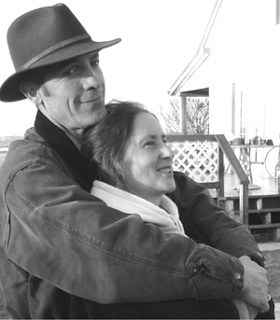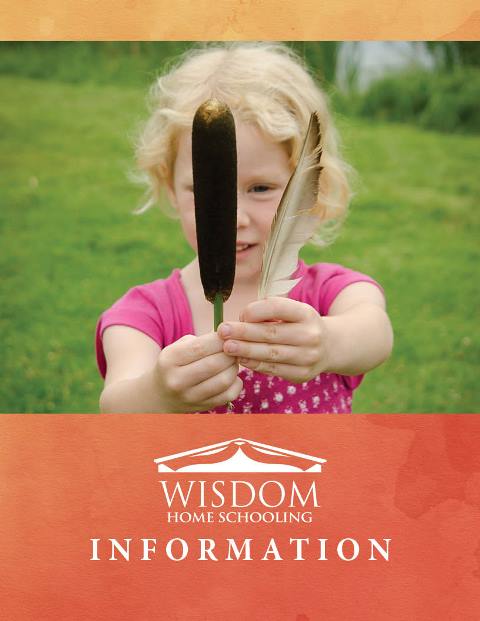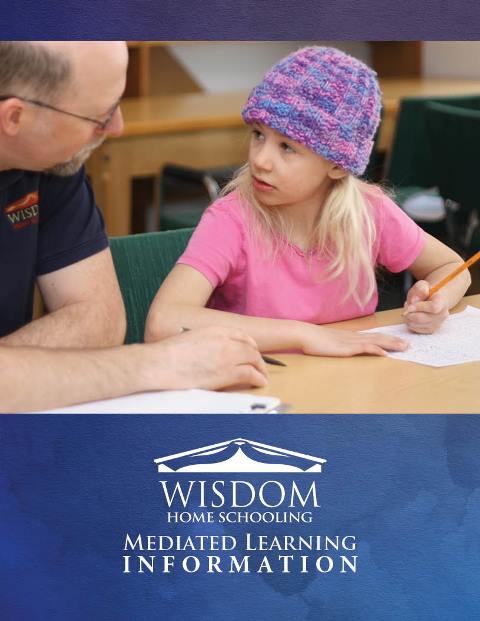Library

- WISDOM Information Booklet
- WISDOM High School Information Handbook
- WISDOM Mediated Learning Information Booklet
Ready to enroll? Sign up here. And don't forget to complete and submit your EFT application for direct deposit of funding.
Additional Resources:
Do you love WISDOM - and want to share us?
Here are some posters for you!
- email them to friends
- post on Facebook with a link to our website
- print them and post in your library, doctor's office, church, grocery store.... etc!
If you'd like for us to print them and mail them to you, just let us know!
Thank you for your support. We love our families and are so grateful that you love us, too!
 |
 |
 |
 |
 |
 |
Sometimes this question comes hard because we lack a context.
Are we talking about our student compared to other students his age? Are we addressing his particular talents and questioning whether he has buried them or multiplied them? Are we asking the question relative to some other standard - if so, what?
Let’s consider measuring success by comparison with other students his age. Before I go any further, please let me assert that in a tutorial context (home schooling) this is the least valuable approach to student evaluation. However, this is the type of evaluation we grew up with, it is the criterion our child (even if he didn’t ever attend school) is very familiar with, and it is possible that it is the primary means by which he views his progress. Realistically, for much of our population, this is the only means by which success, personal value, even life choices are measured, valid or not. A form of relativism, the flaw is evident.
When I completed high school I received an armful of awards that meant nothing. I’m not being humble here; it’s a fact. I received the award for the highest overall average in my graduating class. I also received the Science award and the Math award. This all sounds impressive until you compare my marks with the graduating class three years prior. That particular class was loaded with high academic achievers, many of whom rightfully scored very well in their final grades. Had I been among that class, I would have received not a single award. What’s more, I wouldn’t have seemed very good at the non-academic activities either, for the class three years ahead of me also shone in sports, debate, and public speaking.
Scripture tells us it is unwise to compare ourselves with each other (2Cor 10:12), and wisdom of the ages agrees (the grass is always greener on the other side of the fence); yet we persist. The same circumstances that saw me win all kinds of honour in grade 12 also define achievement - and its lack - in the lives of many people. Students who compare themselves to others will be discontented and frustrated or they will become puffed up, possibly complacent. In any event, their self-concept will be flawed.... (continued by clicking on the link)
Preparing For Fall Facilitator Visit
The following are a few tips to allay anxiety, concern, and apprehension of your facilitator’s home visit with you. (Click on the links for more.)
- Conference with your spouse - and children if appropriate - concerning the goals, planning, and overall vision for each child’s year. Write it down in order to refer to it when your facilitator comes. Keep it simple and to the point.
- Review previous assessments (ie: Spring 2006) and education plans in order to reflect and evaluate ‘where we’ve been’, ‘how we’re doing’, and ‘where we’re going’. Some parents have even filled out the new assessment right on the previous form. If you are new with WISDOM or have misplaced the previous assessment, view education plan samples and the blank assessment form.
- E-mail or call your facilitator within a reasonable time frame prior to the visit for special requests, concerns, scheduling preferences, or anything that will assist the facilitator in making the most of the visit for all involved. If you do not know who your facilitator is, please contact the WISDOM Office to find out.
- Make samples of the children’s work available for your facilitator’s perusal.
- If possible, have a preliminary written draft of each child’s education plan.
- Pray for God’s guidance and for the effective use of the limited time available with your facilitator. We’re praying for you, too.
- Enjoy your facilitator visit, and the start of your new year of study!
 “It’s not fair! I’m so lonely, and I’m stuck at home instead of in school!”
“It’s not fair! I’m so lonely, and I’m stuck at home instead of in school!”
“I’m just curious to see if I could make it—if I could do the work, and fit in with the school kids.”
“High school is an important time to see how I fit in with the world!”
“How can I be a witness to others if I’m home schooled? You should let me go to school where I can help others.”
“You don’t know how I feel about this. It’s really important to me, and I know it’s what I should be doing—it’s what I want!”
Sound familiar?
Looking back with a bit of perspective and clarity, I thank the Lord for His grace and mercy. My home schooling journey began as something we needed to do, something I didn’t feel qualified to do and something I didn’t really want to do. (Ken was the impetus behind it - so I could say he made me do it.)
As we began in the middle of the academic year, we literally ‘brought school home’ including the texts that TobyLauren had been using. (I believe bringing the texts home was a comfort to the superintendent, principal, and teachers who thought we were rather extreme people.) I ‘taught’ Miss TobyLauren in a rather barren manner and her only consolation was that she could teach her 4-year-old brother in a much more noble fashion.......
 It was with the support of their local school principal that Ken and Marlane Noster brought home their eldest child, half way through grade 3. The superintendent threatened to charge them with truancy. The late 80’s were rife with inconsistencies in treatment of home schoolers.
It was with the support of their local school principal that Ken and Marlane Noster brought home their eldest child, half way through grade 3. The superintendent threatened to charge them with truancy. The late 80’s were rife with inconsistencies in treatment of home schoolers.
In response to the first Alberta Home Education Regulation of 1989, Ken was invited to help a school board develop its program for administrating home schooling. He and Marlane began to pray for an answer to two burning questions: how can a board designed to administrate schools administrate home schooling? and what am I being called to do?
 Once upon a time in the not too distant past, there was a home schooling family.
Once upon a time in the not too distant past, there was a home schooling family.
Pa worked, and Ma stayed at home, teaching their five children. They had begun their home school adventure much like many other families, merely bringing school home...
 Are you beating your head against a wall? Is your thirteen year old impossible to teach? Is the curriculum that has worked so well in the past suddenly "boring?"
Are you beating your head against a wall? Is your thirteen year old impossible to teach? Is the curriculum that has worked so well in the past suddenly "boring?"
I recently spoke with a mother of many who, after completing an enjoyable unit study of reading and discussion on Holland, decided her fourteen year old son should follow-up this project with something concrete. She asked him to write an essay on the history of the development of the tulip industry - a topic they had all found to be interesting. As days of reluctance dragged into weeks of resistance, a normally affable mother-son relationship became outright antagonistic....




